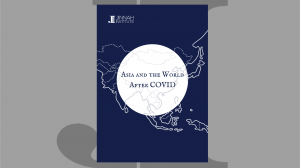COVID-19
Asia and the World After COVID
Date: May 8, 2020

How has the coronavirus pandemic transformed our societies thus far, and what new pressures will it spawn? Leadership responses have varied, as unprecedented demands on states, diplomacy and institutions create new trendlines for a new world. Global thought leaders Rajmohan Gandhi and Barnett Rubin share ideas on what to expect.
Struggling Times

Barnett Rubin is a Senior Fellow and Associate Director of Center on International Cooperation (CIC).
The U.S. will emerge from the pandemic only slowly with a weakened economy and a huge budget deficit, the magnitude of which will certainly impact credit markets. The US has postponed the deadline for filing income taxes, and the record high rate of unemployment means tens of millions of people are not paying payroll taxes, so the federal government’s revenue must be taking a dive, though we don’t have data yet. The revenue of the states, dependent on sales, excise taxes, as well as persona income taxes, have taken a “horrific” fall, gutting the financing of education, health, and other state subjects. Congress bills allocating $2.5 trillion (that’s 12 zeroes) for economic recovery, and it’s not enough. There will be trillions more. Taken all together it means that the US will not have the discretionary income it had in the past to project power.
At first, it looked like China would be strengthened by the pandemic. But now there are growing questions about how the closed nature of the Chinese system contributed to the spread of the disease. China’s aid diplomacy is faltering because of the large amount of faulty equipment it is supplying as it sends masks and other protective equipment around the world. There were already rising questions about BRI and CPEC, but now it is an open question how an economic policy based on connectivity will fare in an era of social distancing. Hence, it is not clear to what extent China will be able to benefit from the weakening of the US. The unfortunate conclusion is that just as transnational cooperation becomes more important than ever, there will be a vacuum in the leadership needed to produce it.
Compelled Solitude

Rajmohan Gandhi is an eminent historian, biographer, and serves as Research Professor at the University of Illinois at Urbana-Champaign.
COVID-19 has given a push to both multilateralism and scapegoating. The virus is bias-free. It is impartial over race, religion, nationality. It is against life, especially human life. But since something in human nature desires a scapegoat for a calamity, we should expect pressures in every country against particular groups of disliked people and/or against particular countries. In countries where popular media loves to target particular groups, we should expect the targeting to intensify, though, given the impartiality of the virus, the targeting may take subtler forms.
But I expect multilateralism — and the notion of a common humanity — to deepen in the minds of millions of serious women and men in the world who are obtaining daily evidence that front-line heroes against the virus represent a variety of races, religions, sects, races and nations. A significant slice of humanity is therefore likely to emerge from the crisis with a firmer belief in our commonness.
“Asia” is an immense space. The story is bound to vary from country to country. If the virus becomes more menacing, attacking all of us in new and larger waves, there may be an urge for changes in leadership. If this does not happen, people may not want — during a crisis — to disturb the existing leadership. However, if large numbers of the worse-off feel unaided when attacked by the virus or by hunger, they will force a change.
Though isolated, many of us are lucky enough to be widely connected across the miles, and sometimes across oceans. Also, while steering clear of people, we are also perhaps loving them more. We probably value our near ones more than we did, and are less likely to take them for granted.
If our prayers are realized and the pandemic recedes, will this recognition also fade away? If envisioning the normal in times of danger is one secret of survival, remembering (after normalcy returns) the sort of risks we face today may be a secret of wisdom.
In India, Pakistan, China or anywhere else, if we use the solitude compelled by the pandemic to ask the frankest of questions — about ourselves, our societies, and our nations — that would be a response the coming generation might appreciate.
_________________________________________________________
Please note that the views in this publication do not necessarily reflect those of the Jinnah Institute’s Board of Directors, Board of Advisors or management. Unless noted otherwise, all material is property of the Institute. Copyright © Jinnah Institute 2020
